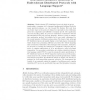264 search results - page 20 / 53 » Bounding the number of tolerable faults in majority-based sy... |
120
click to vote
SSS
2005
Springer
15 years 7 months ago
2005
Springer
Awareness of the need for robustness in distributed systems increases as distributed systems become integral parts of day-to-day systems. Self-stabilizing while tolerating ongoing ...
IPPS
2003
IEEE
15 years 7 months ago
2003
IEEE
Clusters and distributed systems offer fault tolerance and high performance through load sharing. When all computers are up and running, we would like the load to be evenly distrib...
108
click to vote
PPOPP
2005
ACM
15 years 7 months ago
2005
ACM
As the number of processors in today’s high performance computers continues to grow, the mean-time-to-failure of these computers are becoming significantly shorter than the exe...
106
click to vote
IPPS
2006
IEEE
15 years 7 months ago
2006
IEEE
In this paper we tackle the problem of scheduling a periodic real-time system on identical multiprocessor platforms, moreover the tasks considered may fail with a given probabilit...
112
click to vote
ICFEM
2009
Springer
15 years 8 months ago
2009
Springer
Fault-tolerant (FT) distributed protocols (such as group membership, consensus, etc.) represent fundamental building blocks for many practical systems, e.g., the Google File System...

